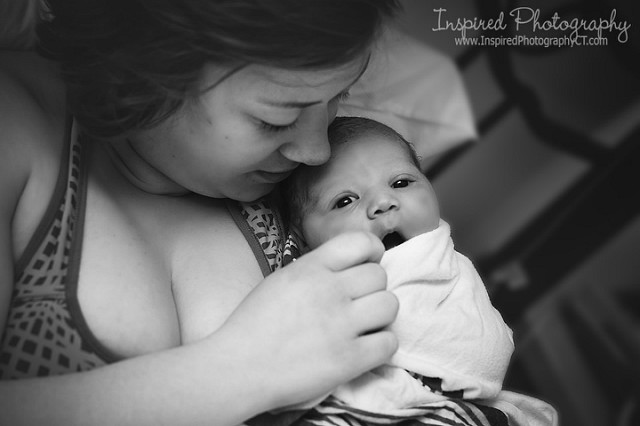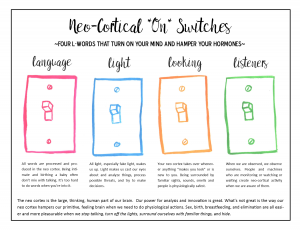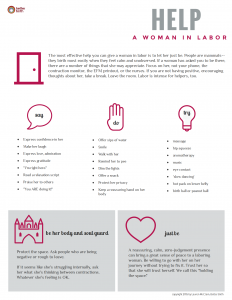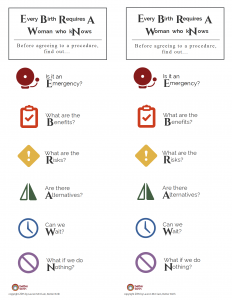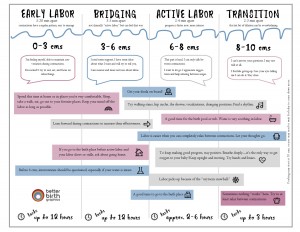Trusting the process…the whole process
Although women have no second thoughts about growing a baby (ooo…gotta work on growing some tiny toenails today!), they very often lack trust in the birth process.
We trust our bodies to grow the baby. We need to trust them to get the baby out as well.
A good childbirth education class will help you trust that process and have positive thoughts about your body. It will also provide accurate information to help you make decisions about your birth.
You should learn about the fear-tension-pain cycle, and how to deal with all three. Probably the most important thing you can learn is how to relax, to let your body and baby do this important work. Birth is not mind work. It’s not cerebral, and not something you can think your way out of. In fact, turning off your thinking brain is the best way to deal with the intensity of labor. Trust your body and your baby.
Learn more about what turns on your thinking mind–your neo-cortex–and takes the trust out of birth, making it harder. Also check out this handout as an instant reference for relaxing your mind:
Understanding and planning the partner’s role
A good birth class goes over the importance of the partner’s role at length. Even if all the partner does is learn to maintain close physical contact, it can help the laboring mom make oxytocin and feel safe and loved. Touching helps the woman feel supported, helps her release pain-numbing endorphins, and helps her stay in the present moment.
Staying in the moment reduces fear, encourages trust, and gets you ‘out of your head.’
The partner’s involvement can also be very romantic for the couple. Lasting, sweet memories are often formed by couples in labor.
There are many ways a partner can be involved. Here’s a simple, one-source reference and guide for birth partners and others who aren’t familiar with helping during labor:
The right, respectful provider
Make sure you have a good provider (doctor/midwife) who you trust and regularly attends the kind of birth you desire. Doctors or midwives who make your feel guilty, sad, unheard, unloved, unnoticed, angry, stupid, or hurt are breaking their hippocratic oath and not worthy of your time and money. Especially when you are planning a birth, you need someone who makes you feel good and safe and loved. This is not a luxury.
Unless you feel safe, loved, cared for, and heard, you will not birth this baby as easily or as safely. It is a physiological necessity that you feel safe when you are giving birth. Without oxytocin, the feel-good, love hormone, your uterus doesn’t contract. It’s that simple.
If you’ve ever felt dismissed, guilty, or upset after a prenatal appointment, you need to have a serious discussion with your provider. Or just quietly transfer your care. If you’ve ever left the office crying, or cried after an appointment, leave.
Here’s how to verify you have a good doctor/midwife without offending anyone.
In the hospital, you can ask for a natural birth friendly nurse. Some really enjoy working with drug-free moms and both kinds of nurses will thank you for specifying!
I know of a couple who left the hospital in labor. They fired their doctor and drove across town in labor to get the kind of care they needed at this important time.
Remember this is your body and your baby
Just because you are pregnant does not mean you give up your human rights or your right to bodily autonomy.
You do not need permission to use your own vagina.
Understand your right to informed refusal. This is the opposite of informed consent. It means you understand the risks and benefits and you refuse the treatment. It’s your body and you have to live with the decision, so you should take ownership in making it.
Providers who try to threaten, belittle, coerce, or guilt you into any procedure or practice are not practicing ethically. You don’t want an unethical provider.
Before anything happens, make sure you understand your options. A handy reminder like this, pasted into the ‘go folder’ can give a couple the words be part of the decision-making process:
Have a birth plan
Here’s a good sample birth plan:
“I will make all the decisions about my care after consulting with you as my paid provider. Any procedures concerning my body or that of my baby should be explained and the decision left to me, every time.”
Birth plans in all their listyness have gotten a bad rap from L&D nurses who skim them and laugh with their friends. They’ve seen too much.
But in some places, birth plans are still very much used to guide care and the providers are thankful to have a simple reference sheet of your preferences.
This is one of the most important, formative, intense days of your life. Having a plan in place is a good idea for you and those who are there to support you. It’s important to know what you want and get everyone possible on the same page. That’s why you take a birth class, get your partner on board, hire a doula, and make a plan.
Looking for more birth planning helps? Check out this Stages of Labor chart, an easy reference for what to expect and what to try at for each step of the way”
Cover image credit: Kala Bernier via Flickr/CC
